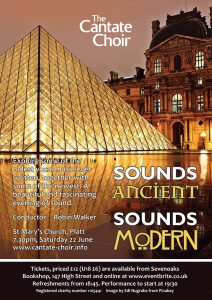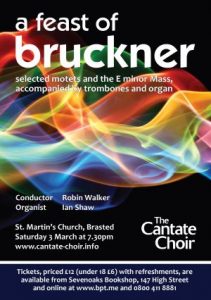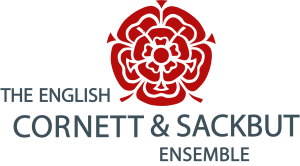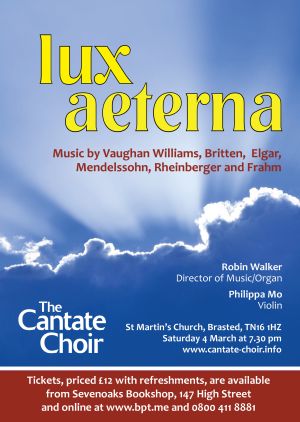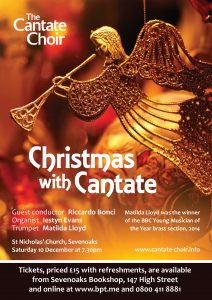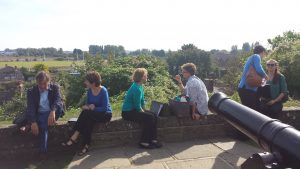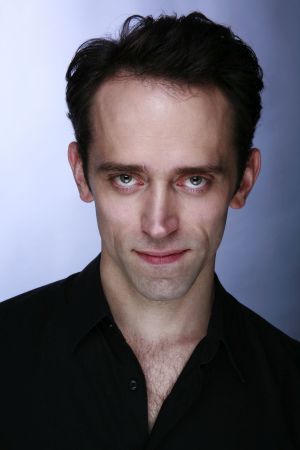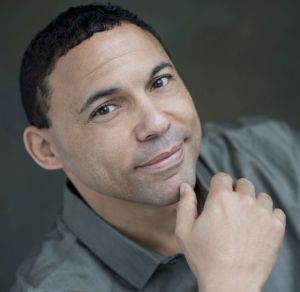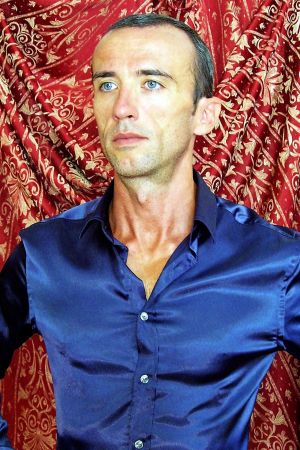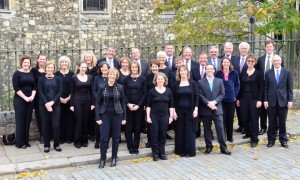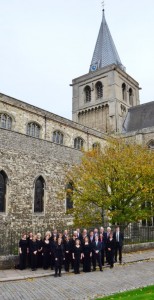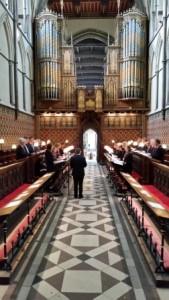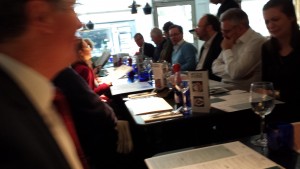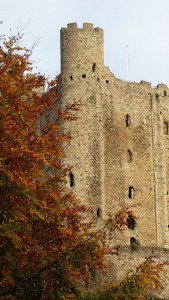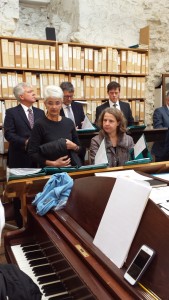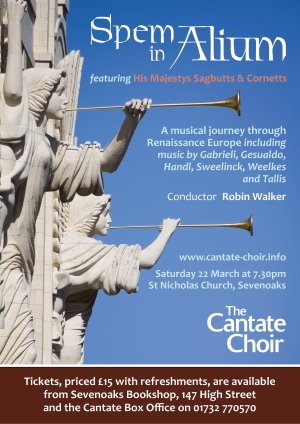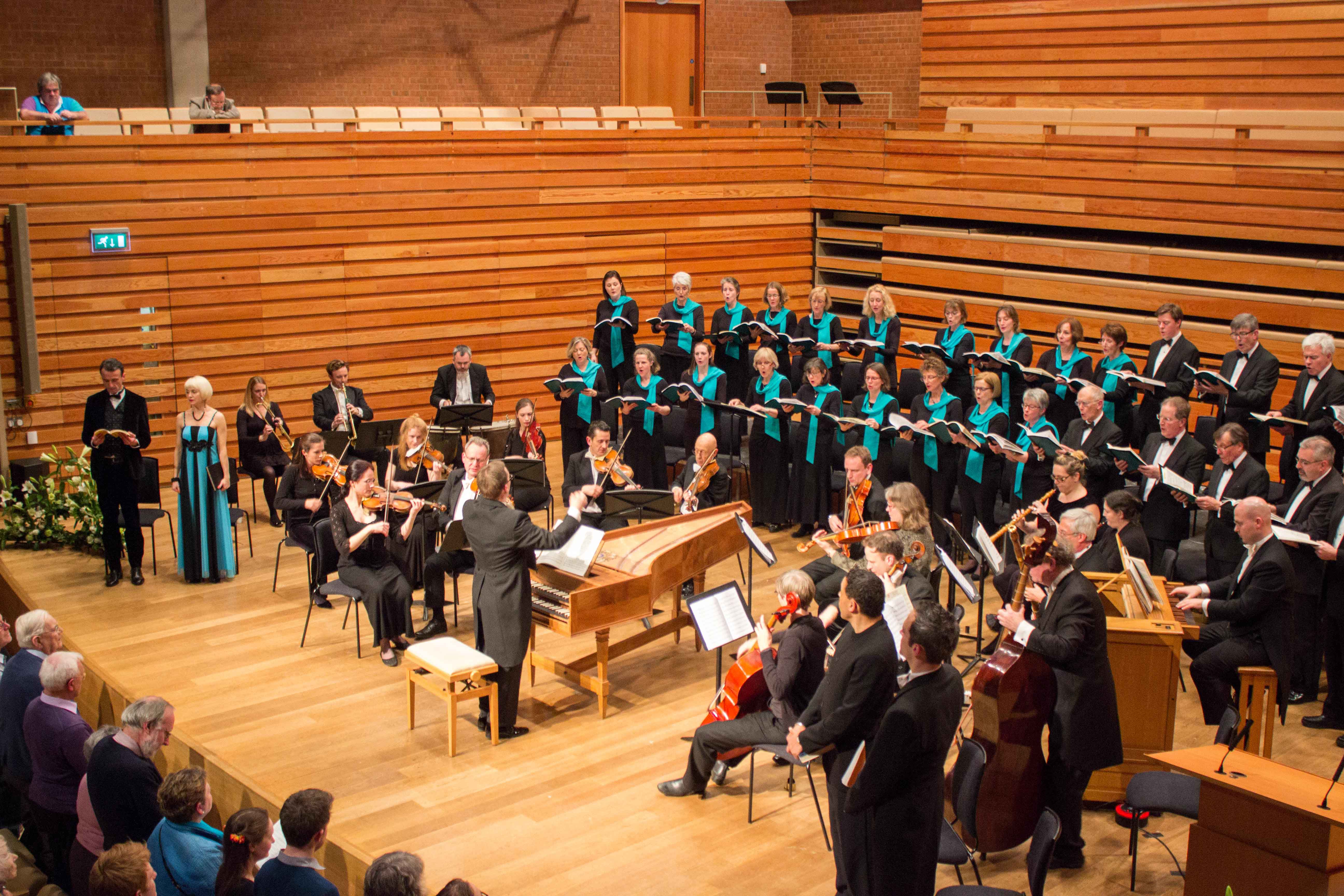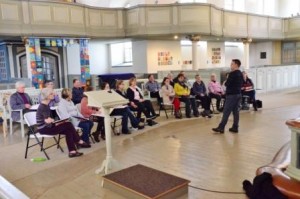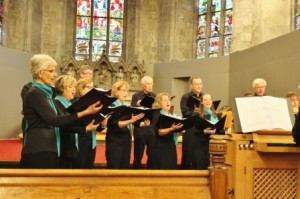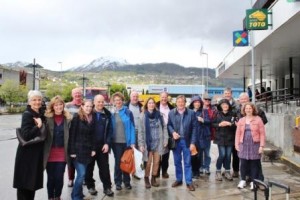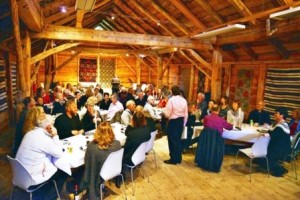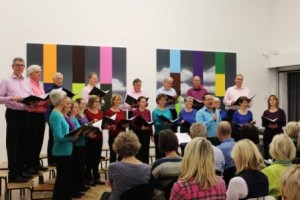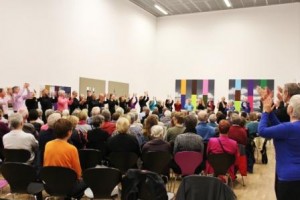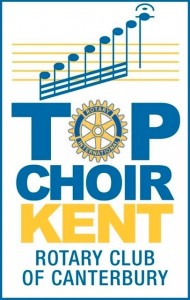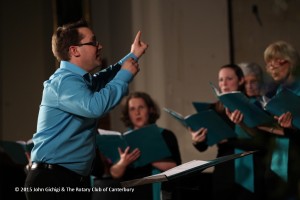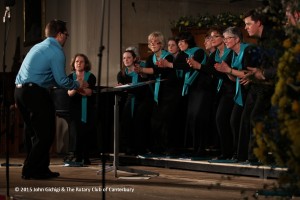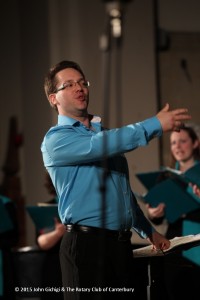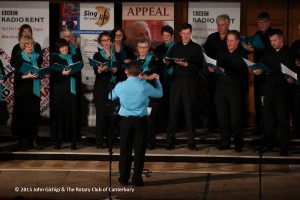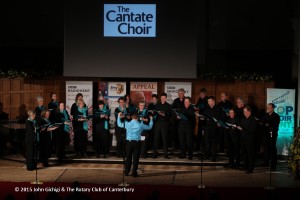All posts by Admin
Christmas Oratorio december 2019
Saturday 14th December 2019 at 7.30pm
at St Peter and St Paul’s Church, Tonbridge.
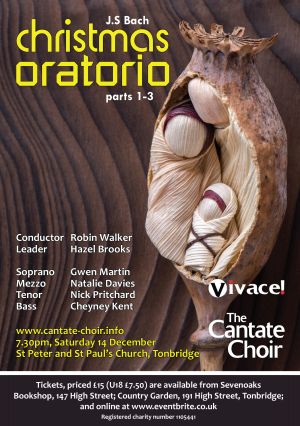
Cantate was once again joined by their sister ensemble Vivace! to perform the first half of Bach’s great setting of the Christmas story. The first three Cantatas took us from the announcement and birth of the Christ-child to the shepherds going to Bethlehem to visit the stable. Masterful story-
telling and joyous choral music always make this piece a wonderful way to start the Christmas season.
For this special concert, Cantate was delighted to welcome back Gwen Martin (soprano) and Nick Pritchard (tenor) and to work with Natalie Davies (mezzo-soprano) and Cheyney Kent (baritone) for the first time. The period-instrument ensemble Vivace! was led by Hazel Brooks.
We enjoyed a glittering retelling of the Christmas story in the beautiful surroundings of St Peter and St Paul’s Church, Tonbridge.
OUR NEXT CONCERT
A MUSICAL OLYMPIAD
Saturday 22nd June, St Mary Platt
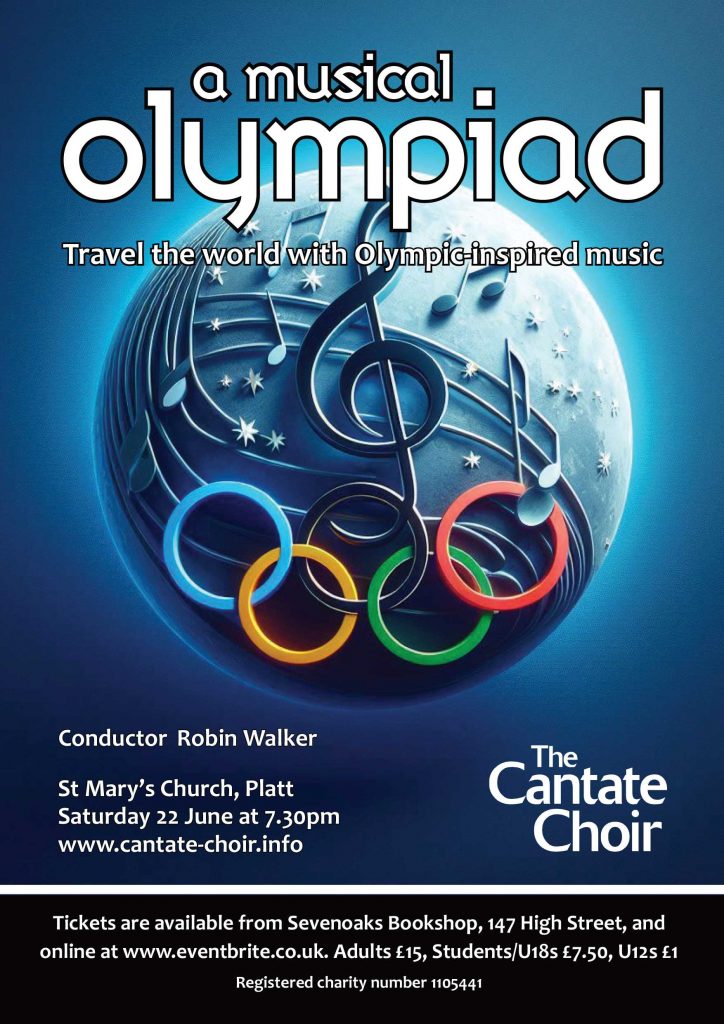
To celebrate the Olympics we are taking you on a musical journey around the world: from Hawaii to Finland, South Africa to Japan we will be bringing you a wide range of musical styles – lyrical songs, hymns to the homeland, lively folk tunes and classical pieces; music with soul and energy in equal measure.
We will be performing traditional songs like Shenandoah (USA) and Thula Sizwe (South Africa) as well as the lively El Hambo (Finland) and expressive Pokarekare Ana (New Zealand). We complete our journey in Paris performing Saint-Saens and Faure, including Cantique de Jean Racine.
Travel with us as we explore the different soundworlds across the globe – there is something for everyone!
Tickets will be available from Sevenoaks Bookshop, online at https://eventbrite.co.uk and from members of the choir.
The direct eventbrite link will be posted here.
Ticket prices: Adults £15 (Friends receive 10% discount), Students/U18 £7.50, U12 £1.
OUR FUTURE CONCERTS
2024-2025 season
16th November 2024 – St Mary’s Kippington
Spring 2025 – tbc.
21st June 2025 – St Martin’s Brasted
Sounds Ancient Sounds Modern June 2019
Saturday June 22nd, 7.30pm, St Mary’s Church, Platt.
For our summer concert this year we explored styles of music which challenged us to get out of our comfort zone. We sang music which bridges over 900 years, opening our concert with music by one of the most important and influential composers in history, Hildegard von Bingen, followed by a work by Stevie Wishart written only a few years ago based around that ancient music. Stevie explores the Medieval sound-world through texture and vocal effects to create a rich and elaborate soundscape, reminiscent of monastic chant and ancient buildings.
A ‘first’ for Cantate was a programme which features exclusively female composers, and we performed music from the Renaissance and the 19th century, with pieces by perhaps the most well-known female composer of the last century, Amy Beach. We concluded our programme with two works by Lauren Redhead, performing one work which is a cappella and a second in which we had an element of improvisation and which we performed with electronics Lauren created especially for this performance.
This was a particularly exciting concert for the choir, working with two contemporary composers exploring the real cutting edge of vocal performance; it challenged us to try a whole new approach as a choir and led to an exciting and enjoyable evening.
Dixit Dominus

DIXIT DOMINUS AND CHORAL AND INSTRUMENTAL WORKS BY PACHELBEL – including the famous Canon.
St Nicholas Church, Sevenoaks
Saturday March 9th
7.30pm
We will be performing Handel’s Dixit Dominus, a wonderfully energetic and challenging piece, together with three stately but joyful baroque choral pieces by Pachelbel. We will be joined by Vivace! who will also perform Pachelbel’s Canon in D. Our guest soloists will perform a Magnificat also by Pachelbel.
Handel understands effect better than any of us—when he chooses, he strikes like a thunderbolt.’
—Wolfgang Amadeus Mozart*
We are delighted to be joined by Vivace! led by Diane Terry as well as guest soloists.
The centrepiece of the evening is Handel’s Dixit Dominus, a setting of the Latin text of Psalm 110. Handel composed the piece while he was in Italy and it was first performed, it is believed, in 1707 when he was just 22. It is an exciting and energetic piece, not without challenges. In the King James version this psalm begins: ‘The Lord said unto my Lord: sit thou on my right hand, until I make thine enemies thy foot-stool’. It is a dramatic, robust and declaratory psalm and this is reflected in the intensity of Handel’s music: there are vigorous arpeggios and majestic fugues, highly layered cascading chorus parts and beautiful solo melodies, leading to a final triumphant Gloria. If you have not heard it before it is a stirring piece, full of drama and contrast, and for those who have, hearing it performed live is always a fantastic and spirited occasion.
The concert will also present four choral pieces and one orchestral piece by Pachelbel. Pachelbel represents the flowering of the south German organ schools and is one of the most important composers of the middle baroque. The Canon in D is well known by many and it is always a delight to hear its elegant and measured chord progression. The choral works are less well known but the choir will be singing three lovely pieces: Jauchzet dem Herrn, a joyful setting of Psalm 100, the buoyant Singet dem Herrn and the stately Lutheran hymn, Was Gott tut, das ist wohlgetan. The final piece, a Magnificat, will be performed by the soloists.
War & Peace, commemorating the end of the Great War.
Saturday 10th November 2018 at St. Mary’s Church, Kippington, Sevenoaks
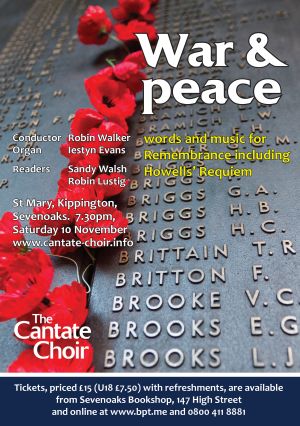
A programme of music and readings, with organ.
Organist: Iestyn Evans
Readers: Sandy Walsh and Robin Lustig
Cantate’s next performance is a special concert to mark the centenary of the end of the First World War. The programme includes songs and readings from poems written during and after the War alongside settings of sacred texts that reflect the choral traditions of the last century. The centrepiece of the concert will be Herbert Howells’ Requiem. Other works include pieces by English composers of the 20th Century, such as Ireland and Elgar, as well as music by Messiaen, Pärt and Whitacre, music to evoke both sadness and hope.
Tickets cost £15 (Friends £12 and under 18s £7.50) and include refreshments.
The programme is approximately 90 minutes without an interval.
Tickets available at Sevenoaks Bookshop, online at www.bpt.com or by phone 0800 411 8881.
Sounds of Light – Summer Concert at Tudeley
Saturday 23rd June 2018 at All Saints Church, Tudeley at 7.30pm
An performance of music ancient and modern, including the world premiere of a piece by local composer and supporter of the choir, Laurie Dunkin Wedd, inspired by the wonderful Chagall windows at Tudeley. We performed the Mass for 5 Voices by Byrd, the Chansons Francaises by Poulenc as well as If Ye Love Me by Tallis and Three Thomas Campion songs by Nunn. It also included the world Premiere of a piece by Frederick Frahm for clarinet and piano which encapsulated the different windows and was performed by Sarah Trigg on the clarinet accompanied by our Director of Music, Robin Walker on the piano.
A FEAST OF BRUCKNER
We performed the E minor Mass and a selection of sacred motets, accompanied by organ and trombones at St. Martin’s Brasted on Sunday 22 April. It was a lovely sunny evening, quite a contrast from the original planned date of the concert which was postponed from March due to the snow.
Through their gorgeous harmonic language and polyphonic layering, their roving melodic lines and unexpected dissonances, these pieces represent compelling examples of Bruckner’s intense sound world. It was a stirring and rewarding evening.
Please note that the poster below has the old date on it.
Rutter’s Magnificat
Saturday 9 December 2017, 7.30pm, St Mary’s Church, Kippington, Sevenoaks
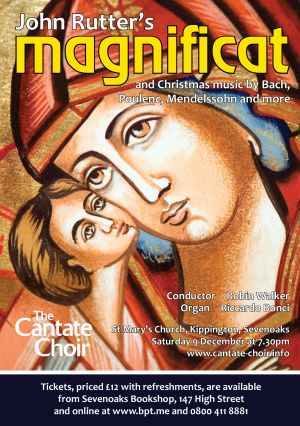 Our next concert is on Saturday 9 December at St. Mary’s Church, Kippington, Sevenoaks. This is a Christmas concert including John Rutter’s Magnificat, and music by Poulenc, Bach, Mendelssohn and more. The Magnificat is an uplifting piece, combining many colourful styles, from sections full of lively energy to moments of peaceful reflection; and it includes the lovely setting of the old English poem ‘Of a Rose’. Robin Walker will conduct and our organist for the evening will be Riccardo Bonci.
Our next concert is on Saturday 9 December at St. Mary’s Church, Kippington, Sevenoaks. This is a Christmas concert including John Rutter’s Magnificat, and music by Poulenc, Bach, Mendelssohn and more. The Magnificat is an uplifting piece, combining many colourful styles, from sections full of lively energy to moments of peaceful reflection; and it includes the lovely setting of the old English poem ‘Of a Rose’. Robin Walker will conduct and our organist for the evening will be Riccardo Bonci.
Monteverdi’s Vespers of 1610
Saturday 14 October 2017
Pamoja Hall 7.30pm
With Vivace and The English Cornett & Sackbut Ensemble
Director of Music: Robin Walker
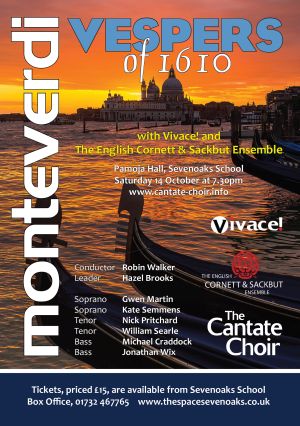 Born in Cremona, Monteverdi was a composer and court musician particularly known for books of madrigals and operas. His work transitions from Renaissance polyphony to Baroque melody including pioneering techniques such as bass continuo. The Vesperis in Festis Beata Mariae Vergine, more casually known as the Vespers of 1610, was his first sacred work in nearly 30 years reflecting a blend of both styles. In scale it represents one of the most ambitious works of religious music written before Bach. It is a large, complex and ground-breaking piece noted for its brilliance and power.
Born in Cremona, Monteverdi was a composer and court musician particularly known for books of madrigals and operas. His work transitions from Renaissance polyphony to Baroque melody including pioneering techniques such as bass continuo. The Vesperis in Festis Beata Mariae Vergine, more casually known as the Vespers of 1610, was his first sacred work in nearly 30 years reflecting a blend of both styles. In scale it represents one of the most ambitious works of religious music written before Bach. It is a large, complex and ground-breaking piece noted for its brilliance and power.
Special guest soloists will perform with The Cantate Choir and we will be joined by Vivace and The English Cornett & Sackbut Ensemble for what promises to be a wonderful evening.
Tickets cost £15. (concessions £7.50 U18s)
For more information and a link to book tickets, go to http://www.thespacesevenoaks.co.uk/whats-on/music/
Solstice of Light – June 2017
St Mary’s Platt, Sunday 25th June 2017
With William Searle (tenor) and Ian Shaw (organ).
 The centrepiece of our summer concert was the Solstice of Light, Peter Maxwell Davies’ Cantata for tenor, choir and organ. Its fourteen movements form a poetic history of Orkney with beautiful melodic moments and some wonderful harmony. This highly evocative piece was performed as the long light of June lasted into the evening making it a very special occasion.
The centrepiece of our summer concert was the Solstice of Light, Peter Maxwell Davies’ Cantata for tenor, choir and organ. Its fourteen movements form a poetic history of Orkney with beautiful melodic moments and some wonderful harmony. This highly evocative piece was performed as the long light of June lasted into the evening making it a very special occasion.
We also be presented a wonderful setting of Shakespeare’s song from Cymbeline, Fear No More, by Jonas Magnussen, being performed for the first time in the UK, as well as two pieces by New Zealand composer Paul Newton-Jackson.
We were joined by special guests, tenor William Searle and organist Ian Shaw. William performed a beautiful selection of English solo songs as well as the tenor role in Solstice of Light. Ian played an organ solo during the first part of the concert as well as performing the fantastic, virtuoso solo sections in Solstice of Light.
Strawberries and drinks were at 6.30pm in the Churchyard and the concert followed at 7.00pm.
Lux Aeterna March 2017
Saturday March 4th 2017 – St. Martin’s Church, Brasted.
The choir performed a capella music full of melody and luscious harmony by Mendelssohn, Elgar, Vaughan Williams and Britten, while our special guest soloist Philippa Mo played a range of pieces for the violin.
Two of Mendelssohn’s motets for eight-part choir opened the concert. Philippa then played two pieces for violin by German Romantic composer Rheinberger; she was accompanied on the organ by Robin Walker. Britten’s Five Flower Songs followed, fascinating settings of works by poets such as Herrick and Clare. Philippa then performed a new work by Frederick Frahm Grendel’s Soliloquy. Closing the first half was Sir Edward Elgar’s famous Nimrod, arranged for choir and set to the text Lux Aeterna.
The second half was a feast of Vaughan Williams, opening with The Lark Ascending. The choir then performed the composer’s Mass in G minor for double choir and soloists, a truly great work of the English 20th century choral tradition.
Christmas celebrations
The Cantate Choir performed a sparking celebration of Christmas in December at St. Nicholas Church, Sevenoaks. We were very fortunate to be joined by Matilda Lloyd, the wonderfully talented trumpeter who won the brass section of the BBC Young Musician of the Year 2014, and whose solo pieces by Bach and Damase were very much enjoyed by the audience. The choir, under guest conductor Riccardo Bonci, performed a variety of Christmas carols, including some new ones to us – by Maxwell Davies, Wishart, Matthias and Howells. Of course there were plenty of audience carols too and Matilda joined in playing from the gallery and Iestyn Evans joined us on the organ. The evening included rousing renditions of popluar favourites The Twelve Days of Christmas and Jingle Bells, with We Wish You a Merry Christmas as a spirited encore.
Christmas with Cantate
St Nicholas’ Church, Sevenoaks.
Saturday 10th December 7.30pm.
With guest conductor Riccardo Bonci and organist Iestyn Evans.
Our Christmas programme will feature carols, old and new. From Wassail song to Wishart, with Bach, Vaughan Williams and Rutter, and, of course, we hope you will join with us to sing our favourite carols together!
This year we are delighted to be performing with our very special guest soloist – Matilda Lloyd on trumpet. Matilda won the brass section of the BBC Musician of the year in 2014 and made her Proms solo debut this year with the BBC Philharmonic; she has also played with the Academy of St. Martin in the Fields for the Classic FM Live concert at the Royal Albert Hall and she has appeared on In Tune on Radio 3. She works with a variety of orchestras and she currently reads music at Trinity College, Cambridge and studies the trumpet with Mark David, Head of Brass at the Royal Academy of Music, London. She will be joining us to perform many well-known carols and she will be playing solo pieces including Bach’s Concerto in D Major after Vivaldi.
For a glorious, sparkling start to the Christmas season do come and join us!
Tickets are £15 including refreshment and are available at Sevenoaks Bookshop or online and by phone from Brown Paper Tickets on www.bpt.me and 0800 411 8881. They will also available from members of the choir.
You can register to receive e-mail updates from the home page of this website.
Rye Festival 2016
The Cantate Choir were delighted to have been invited to take part in a special multi-choir concert at the Rye Festival in September. Three choirs came together to collaborate on an evening concert in St. Mary’s Rye. Each choir presented a short programme and we were very pleased to perform again some music from our summer concert – a piece by Frederick Frahm, Who is Wise Among You and the piece Huw Morgan dedicated to Robin Walker and Cantate Choir: Ave Regina Caelorum.
We then joined with the other choirs to form one very large chamber choir. Together we performed multi-part music, working up from Lotti’s beautiful 8-part Crucifixus to the breath-taking 16-part Crucifixus by Caldara and climaxing with Tallis’ 40-part masterpiece Spem in Alium.
We are thrilled to have been asked to take part alongside The Straight 8 and Tongswood Chamber Choir and the full choir was conducted by the internationally acclaimed Peter Phillips, founder of the Tallis Scholars. The organisers in Rye treated us exceptionally well and we had a lovely day.
It was a beautiful Autumnal weather and you can see members of the choir enjoying a few moments of rest over the view of Romney Marsh.
Vivaldi Gloria and works by living composers in association with Firehead Editions.
We enjoyed performing Vivaldi’s Gloria in May 2016. Written in around 1715 it is a joyous, sparkling piece for choir and soloists and it is always a great pleasure to perform.
But also, every excitingly, and building on our tradition of presenting new music, we also performed a selection of pieces from Firehead Editions. This is a collective of three contemporary composers: Frederick Frahm, Huw Morgan and Nicholas Wibberley. They have written music for a wide variety of different contexts and are all distinguished composers, conductors and performers. We sang a range of different pieces by them including Frederick Frahm’s Who is Wise Among You and the premiere of a piece especially written for us by Huw Morgan, Ave Regina Caelorum, dedicated to Robin Walker and Cantate Choir. We really enjoyed working on this new material and were delighted to perform our very own piece. All the composers attended the concert as part of a weekend of performances of music from their label.
Trevor Eliot-Bowes
Trevor performed with the Cantate Choir in the Handel’s Messiah in January 2016.
Bass-baritone Trevor Eliot Bowes was born in Victoria, Canada and studied at the University of Toronto and RSAMD. He made his British debut as Trulove in The Rake’s Progress at the Aldeburgh Festival where he has also performed Purcell’s King Arthur and The Faerie Queen. Trevor has performed in St. Petersburg, Moscow and Hamburg as Fedro in Mattheson’s Boris Goudenow for Early Music Russia and in Strasbourg for Le Parlement de Musique. Concert performances include the Thief in Grieg’s Peer Gynt with the RSNO, Bach Cantatas under Helmuth Rilling in Toronto and Brahms’ Ein Deutsches Requiem at the Usher Hall, Edinburgh. Trevor was formerly a full-time member of Opera North, where highlights include Talbot in Maria Stuarda opposite Sarah Connolly, and the drum-maker in Jonathan Dove’s The Adventures of Pinocchio. Recent engagements include Marschallin’s Footman/Boots in Der Rosenkavalier at Glyndebourne, Castro in La Fanciulla del West at English National Opera and a recording of Balfe’s Satanella (Arimanes) under Richard Bonynge to be released on Naxos in 2016. Trevor is now a full-time member of English National Opera.
Tom Randle
Tom performed with the Cantate Choir in the Handel’s Messiah in January 2016.
Tom Randle began early studies in conducting and composition, but a scholarship to study voice soon meant a change in career direction. He made his début with the English National Opera as Tamino in The Magic Flute and has repeated the role with great success at Deutsche Oper Berlin, Glyndebourne Festival Opera, Hamburg, New Zealand and the Covent Garden Festival. Well known for his vivid and committed stage portrayals and a unique ability to embrace a wide variety of repertoire, Tom has emerged as one of the most exciting and versatile artists of his generation.
This Season, Tom Randle will partake in the world premiere of Marta, a new opera written by Wolfgang Mitterer, under the baton of Clement Power at Opéra de Lille followed by Die Soldaten with the Teatro Colon. Future engagements will include Elecktra with Berlin Staatsoper (co production with Aix) followed by Gran Teatre del Liceu.
Tom Randle made his Royal Opera House début as Essex in Phyllida Lloyd’s highly acclaimed production of Gloriana, which was later released as a feature film for BBC Television. Other appearances for the Royal Opera include Johnny Inkslinger in Paul Bunyan and the Fool in Gawain. Tom Randle is very active in the field of contemporary music with several world premières to his credit, many of which were written especially for him. This includes the role of Dionysus in John Buller’s opera The Bacchae for ENO, the world première of Peter Schat’s opera Symposium for the Netherlands Opera, and the world première of John Taverner’s oratorio The Apocalypse for the BBC Proms. He also created the role of Nunez in Mark-Anthony Turnage’s opera The Country of the Blind, written for the 50th Anniversary of the Aldeburgh Festival, and premiered and recorded Penderecki’s oratorio Credo for the Oregon Bach Festival. His intense portrayal of Judas in the world première of Birtwistle’s Last Supper under Daniel Barenboim at the Staatsoper Berlin (as well as Glyndebourne) won him outstanding critical acclaim.
Mr Randle devotes equal time to an active concert career, singing with many of the world’s leading orchestras including the Boston and Chicago Symphony Orchestra, Los Angeles Philharmonic, The London Symphony, Philharmonic and Philharmonia Orchestras, the Israel Philharmonic, Orchestre Philharmonique de Radio France, The English Concert with conductors such as Daniel Barenboim, Michael Tilson Thomas, Sir Colin Davis, Myung-Whung Chung, Yan-Pascal Tortelier, Ghennadi Rozhdestvensky, Richard Hickox, Harry Christophers, Trevor Pinnock, and Ivan Fischer. Amongst his recordings are the title role in Handel’s Samson with Harry Christophers on Collins Classics, Vaughan Williams’ A Cotswold Romance with the London Symphony Orchestra and Hickox for Chandos (both premiere recordings) and orchestral works by Luigi Nono on the EMI label. Tom also appeared as Molqui in the ground-breaking film version of John Adams’ Death of Klinghoffer for Channel 4, released on DVD, and as Monostatos in Kenneth Branagh’s The Magic Flute.
As a composer, his works have been performed in the UK, Europe and the US, including the Buxton and Presteigne Festivals, Lille Opera and the Broad Stage concert hall in Los Angeles. His latest opera ‘A telephone Call’ premieres this spring with Second Movement, and will later form part of the Tètè Opera Festival.
Francesco Ghelardini
Francesco performed with the Cantate Choir in the Handel’s Messiah in January 2016.
Francesco Ghelardini was born in Florence and has studied Singing with Kathleen Lafferty at the Conservatorio Luigi Cherubini, where he also studied Recorder with David Bellugi. He attended classes in baroque performance with Rossana Bertini, Jill Feldmann, Gloria Banditelli and Christophe Rousset.
He has sung with such recognized conductors as Rinaldo Alessandrini, Peter Phillips, Andrew Lawrence-King, Alan Curtis and has been regularly invited to many leading festivals in Italy and abroad, such as Festival Monteverdiano di Cremona, Festival Pucciniano di Torre del Lago, Festival di Spoleto, Accademia Chigiana, Auditòrio Nacional de Musica de Madrid, Maggio Musicale Fiorentino, Milano Classica, Barocktage Stift Melk. He has sung the main part in Alessandro Melani’s Il Sacrificio d’Abel with Concerto Italiano under conductor Rinaldo Alessandrini at the early music festival Trigonale in Klagenfurt (Austria) and in Cuenca (Spain) at the Semàna Musica Religiosa. He has sung the title role in Carissimi’s Historia di Job at the Queen Elizabeth Hall in London and at Festival Barocco in Viterbo. In Florence at the Teatro della Pergola he has played the role of Amore Divino in A. Scarlatti’s Trionfo della Vergine SS with the baroque orchestra Il Rossignolo and the roles of Secrecy, Mopsa and Chinese Man in Purcell’s Fairy Queen at the Teatro Goldoni with Maggio Fiorentino Baroque Orchestra. Most recently he has been Cornelia in Scarlatti’s Il Trionfo dell’Onore at the Teatro Verdi in Pisa.
His recordings, for labels like Opus111, Divox Antiqua and Tactus, include Monteverdi’s Vespro della Beata Vergine for OPUS111 with Concerto Italiano and Cesti’s Le Disgrazie d’Amore for Hyperion with Auser Musici (The Courtier).
Programme Notes – Handel’s Messiah
I know that my Redeemer liveth, and that he shall stand at the latter day upon the earth. And though worms destroy this body, yet in my flesh shall I see God. Book of Job xix:25-26
These words, which begin Part III of the mighty oratorio ‘Messiah’, were inscribed on George Frideric Handel’s tomb in Poets’ Corner in Westminster Abbey when he died in 1759. This aria, written in the optimistic, bright and certain key of E major, opens with two notes (dominant rising to tonic) and sums up for me the entire piece; without any shadow of a doubt, with no possibility for confusion, Handel says, ‘I believe’. He genuinely felt that the whole piece was given to him by God. As Patrick Kavenaugh records in his Spiritual Lives of the Great Composers, Handel said to his bemused servant “I did think I did see all Heaven before me, and the great God Himself.” Handel had just finished writing a movement that would take its place in history as the Hallelujah Chorus.
How fitting it is that tonight’s performance is in aid of The Hospice in the Weald. In 1741, two letters arrived, which changed Handel’s position and musical history forever. First came an invitation from the Duke of Devonshire to come to Dublin and provide a series of benefit concerts ‘For the relief of the prisoners in the several gaols, and for the support of Mercer’s Hospital in Stephen Street, and of the Charitable Infirmary on the Inn’s Quay’. Then, a letter arrived from Charles Jennens, a literary scholar and editor of Shakespeare’s plays, who had previously written libretti for Handel. The letter contained Old and New Testament texts, which Handel read and re-read and was so moved that he immediately embarked on writing a sacred opera using them. Messiah premiered on April 13, 1742 in Dublin as a charitable benefit, raising 400 pounds and freeing 142 men from debtor’s prison. It has not been out of performance for a single year since, a record unsurpassed by any other classical work. It was performed again and again for charitable concerts and Handel would not take a penny from the ticket sales, believing that God, not he, had written the piece. At his death, he bequeathed the manuscript and parts to the Foundling Hospital, founded by Thomas Coram in 1739, which continues to benefit to this day from performances of Messiah. Charles Burney, the 18th century music historian, remarked that Handel’s Messiah “fed the hungry, clothed the naked, and fostered the orphan.”
Why then, is Messiah such an enduring and monumental piece? Why is it performed every year all over the world? Why are there choral societies committed to performing nothing else? It is not a typical oratorio; there are no named characters, no plot and no narrative. There is no drama of action or personalities and no dialogue. Our usual thirst for soap opera shenanigans will not be satisfied here. So why do we keep coming back for more?
For one thing, it is a work, whose three parts, take in the entire sweep of the traditions and beliefs of the Christian faith and follows the liturgical year:
- Part I- Prophecy of Salvation, the birth of Christ Jesus (Advent, Christmas)
- Part II- Crucifixion and Death (Lent, Easter, Ascension, Pentecost)
- Part III- Resurrection and the promise of eternal life for believers (End of year and end of time)
The second reason for its recurrent popularity is that it is simply full of good tunes and rousing choruses, which enable us as Everyman to grasp something of the ineffable mysteries of these sacred texts and to go away feeling spiritually uplifted regardless of our beliefs and understandings.
The main reason, however, has to be the sheer genius of the man (or perhaps it really was his divine inspiration). Handel paints the texts so vividly and gloriously that it seems impossible not to be profoundly moved by each and every aria, chorus and instrumental interlude.
The libretto by Jennens is also monumental and scholarly. The texts are compiled from the Bible: mostly from the Old Testament of the King James Bible, but with several psalms taken from the Book of Common Prayer. He takes lines from here and there to construct ‘scenes’ of meditation upon aspects of the Messiah. We perform Part I complete, which takes us through the surprisingly restrained prophecies and announcements of Christ’s coming, through the excitement of the birth (For unto us a child is born), the appearance of angels before the shepherds (Glory to God) and on to the great optimism of the believers (Rejoice greatly, He shall feed his flocks).
Part II deals with Christ’s sufferings and betrayal. We cut numbers 27-37, which deal with the actual crucifixion and reception into Heaven, and take up the scene with the moving reaction to his death (How beautiful are the feet) and the gradual spreading of the gospel despite the world’s rejection (Hallelujah). Part III is also shortened to focus on the certainty of believers that the Redeemer is still very much alive in men’s hearts and that when ‘The Trumpet shall sound’ death and sin will be conquered and we will find ourselves with God. The final chorus maintains the focus solely on the Messiah, not the unworthy mortals who usually receive some absolution at the end of such works. “Worthy is the Lamb that was slain and hath redeemed us to God by His blood, to receive power, and riches, and wisdom, and strength, and honour, and glory, and blessing. Blessing, and honour, and glory, and power, be unto him who sitteth upon the throne and unto the lamb for ever and ever, Amen.”
Sara Kemsley
Messiah Triumph
The Cantate Choir’s recent performance of Handel’s Messiah raised a fantastic £10,500, exceeding our original target. The money raised went to Hospice in the Weald and we were delighted to be able to support them with our first charity concert. We weren’t sure if we would manage to fill the Pamoja Hall in Sevenoaks School but it was a sell out!
We had a fantastic time performing with our regular partner orchestra ‘Vivace!’ and the wonderful soloists. For more details of the concert follow this link: http://www.cantate-choir.info/gala-concert-handels-messiah/
We would like to thank our sponsors and advertisers who helped us with the fundraising and to everyone who donated prizes for the charity raffle. And of course, thank you to all those who came and were such a great audience for us.
It was a thrilling evening – We hope you enjoyed it as much as we did.
For a link to a review of the concert follow the link: http://www.cantate-choir.info/review-of-handels-messiah-by-graeme-fife/
Vivaldi Gloria and works by living composers
Saturday 21 May 2016, 7.30pm, St Mary’s Kippington, Sevenoaks
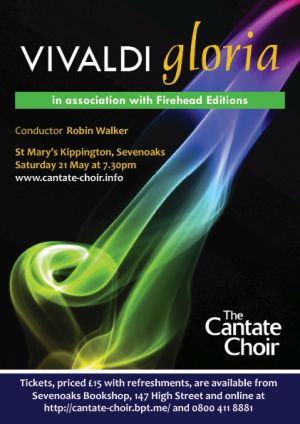 Vivaldi Gloria and works by living composers in association with Firehead Editions.
Vivaldi Gloria and works by living composers in association with Firehead Editions.
The Cantate Choir will be performing Vivaldi’s Gloria in May. Written in around 1715 it is a joyous, sparkling piece for choir and soloists, with distinctive, sunny harmonies and beautifully expressive moments. This lovely, uplifting music forms the centrepiece of our concert.
Following our tradition of presenting new music, we will also be performing a selection of pieces from Firehead Editions. This is a collective of three contemporary composers: Frederick Frahm, Huw Morgan and Nicholas Wibberley. They have written music for a wide variety of different contexts and are all distinguished composers, conductors and performers. Their music is intelligent, well-considered and attractive, and is performed the world over. We are delighted to be presenting a selection of their recent works, both sacred and secular, which we are sure you will enjoy.
We look forward to welcoming you to an inspiring evening of old and new music.
Tickets are £15 and will be available at Sevenoaks Bookshop or online and by phone from Brown Paper Tickets and 0800 411 8881. They will also available from members of the choir.
You can register to receive e-mail updates from the home page of this website.
Our 2020 Programme
SADLY WE WERE NOT ABLE TO PEFORM THIS PROGRAMME DUE TO COVID BUT WE HAVE KEPT THIS AS A RECORD OF WHAT WE HAD ORIGINALLY PLANNED.
Saturday 20th June 2020, 7.30pm – St Botolph’s Church, Chevening
Midsummer Idyll – folk songs and part songs for a summer evening.
Saturday 7th November 2020, 7.30pm – St Mary’s Church, Kippington
Gunpowder, Treason and Plot – A journey through pivotal moments in history with music for times of Revolution.
Saturday 12th December 2020, 7.30pm – St Mary’s Church, Riverhead
O Tannenbaum – a feast of seasonal music and traditional carols for all the family, surrounded by St Mary’s Christmas Tree Festival.
Review of Handel’s Messiah concert by Graeme Fife
23rd January 2016
Pamoja Hall – Sevenoaks School
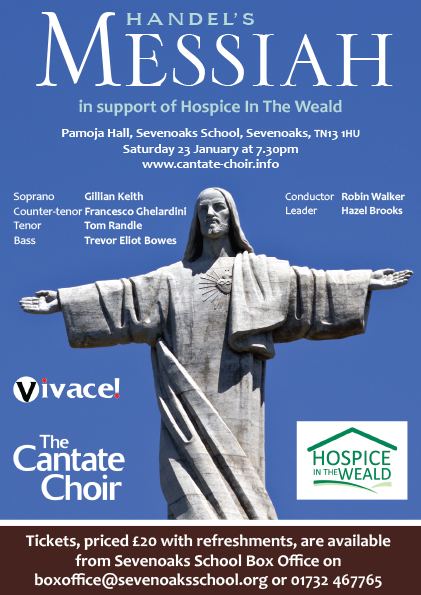 Handel composed the music for Messiah in twenty four days in August, 1741 – a speed of writing not unusual for him. Its first performance was given in Dublin – for reasons which need not detain us here – and takings for the concert benefited three charities. It was entirely appropriate, then, that Cantate chose this great oratorio for their showpiece concert and made it a benefit performance for Hospice in the Weald. Their target: £10,000.
Handel composed the music for Messiah in twenty four days in August, 1741 – a speed of writing not unusual for him. Its first performance was given in Dublin – for reasons which need not detain us here – and takings for the concert benefited three charities. It was entirely appropriate, then, that Cantate chose this great oratorio for their showpiece concert and made it a benefit performance for Hospice in the Weald. Their target: £10,000.
The choir which sang that first night in Dublin comprised 32 singers, about the same as the forces on which Cantate’s energetic conductor, Robin Walker, can call. The excellent instrumental ensemble Vivace!, with whom the choir collaborates from time to time, is also small in number but large and generous in music.
The wood-lined, open barn-like structure of the Pamoja Hall at Sevenoaks School (the word is Swahili, meaning ‘together’) has a feel of the Snape Maltings and this evening the combined forces of choir and small, elite orchestra filled it with a glorious diapason.
For this gala occasion, Walker secured the services of four soloists of singular distinction: Gillian Keith (soprano), Francesco Ghelardini (counter-tenor), Tom Randle (tenor) and Trevor Eliot Bowes (bass). Each of them sang with wonderful clarity of tone and diction, and a pure musicality which, allied to the verve and sonority of the Cantate choir, and the crisp and rounded playing of Vivace! made for a fine and memorable performance.
From the very opening, Walker conducting from the continuo console, the level of singing and playing was of the highest quality. (Handel had his own organ shipped to Ireland.) It was good to watch, too – never overlook the small drama of two Baroque trumpeters and timpanist gliding in noiselessly through a side door like stealthy autograph hunters during one movement to take up position for their contribution in the next number.
Fugal passages are where most choirs falter, if they lack cohesion, but Cantate have a choral discipline second to none. Moreover, they exhibit a fluent control of dynamic, tone and vocal coherence which comes only from alert intelligence, thorough-going rehearsal ethic and excellent pitching of notes.
There is no evidence that king George II was even present at the first performance of Messiah in London and the earliest mention of the audience standing during the Hallelujah chorus dates to 1756. However, when the audience in Pamoja stood up together this evening, there was a palpable thrill in the hall.
At the end of the interval – glasses of English vineyard fizz and a second visitation of raffle ticket sellers in the foyer – the choir master triggered another thrill in the hall: the evening had raised more than £10,000. Hallelujah.
When Handel reached Fishguard en route to Ireland, he dined at an inn where he ordered ‘dinner for two’. When the landlord asked him where his dining companion was, the composer replied: ‘I am der two.’ Gargantuan appetite, superabundant musical genius and sponsor of another triumph for Cantate.
Graeme Fife
Visiting Choir- Rochester Cathedral
Cantate Choir visit Rochester Cathedral.
For the weekend of October 24th-25th we were privileged to be the visiting choir at Rochester Cathedral singing the services on Saturday and Sunday. This was a wonderful opportunity for us to sing church music in this beautiful, historical setting, joining a tradition of music for worship that has been continuous since 604AD.
We prepared a fantastic series of pieces spanning the centuries of the finest church music from Ramsay, Purcell and Ayleward to Stanford, Howells and Harris and up to the modern day with the Missa Brevis by Dove. From rehearsing in the music rooms in one of the towers to sharing a lunch together at Pizza Express as well as becoming, for a short while, part of the life of the cathedral, the whole weekend was very enjoyable. We were delighted to receive so many compliments for our singing from the congregation. It was particularly special to hear the music in the beautiful acoustic of the cathedral and we hope to return to perform in this glorious space some time in the future.
Thomas Tallis – Spem in Alium – Programme notes
7.30pm, Saturday 22 March 2014 – St Nicholas Church, Sevenoaks
Rejoice in the Lord alway, and again I say rejoice. Philippians 4:4-7
There can be no doubt that much of the greatest western music ever conceived has been done so in affirmation of Christian beliefs and never more so than in the sixteenth and seventeenth centuries. All over Europe and Britain, composers and performers were learning from each other and competing with each other to pay greater homage to God, to his son Jesus and his mother Mary.
Our musical journey tonight takes us through Italy, into Slovenia and Germany and thence to the Netherlands. From there, we cross the channel to devote the whole of the second half to English pieces and rightly so. The Europeans were good at this time but arguably the English were better. This period under Mary I, Elizabeth I and James I was prosperous but fraught with religious tensions as Catholic and Anglican loyalties were tested beyond the very limits of endurance. Not until the twentieth century does Britain again boast so many composers to equal those of Europe.
Joining us on our journey are the illustrious period instrumentalists, His Majestys Sagbutts and Cornetts. The cornett, put simply, is a wooden trumpet with finger-holes. It is very versatile and capable of great flexibility. This is also true of the narrow-bored sackbut with its slide mechanism. Both could play many more notes than other wind instruments of the time and so were very popular with composers to supplement and complement music for human voices, the pre-eminent medium of the day. Players would often embellish the vocal parts and improvise variations (divisions) in between. Bottrigari in his instrumental treatise of 1594 in Venice said “Cornetts and trombones…play divisions that are neither scrappy, nor so wild and involved that they spoil the underlying melody and the composer’s design: but are introduced at such moments and with such vivacity and charm that they give the music the greatest beauty and spirit.” HMSC have chosen pieces which perfectly complement our programme and also play with us in four pieces after the custom of the day.
Our opening set from Italy demonstrates the extraordinary creative range of the period; Gabrieli effervesces, Palestrina is more thoughtful and considered, Gesualdo you will recall from our last concert is pretty weird for the times but wait until you hear the highly chromatic instrumental piece by Guami!
Moving then to central and northern Europe, you will probably notice a heavier tread and thicker accent, if I may risk such stereotyping! Jacob Handl from Slovenia was a counter-reformation Catholic and therefore the words he set had to be crystal clear. This setting of the Lord’s Prayer is unusual in juxtaposing a high choir with a low one. The German composers (Hassler, Scheidt, Schütz) were familiar with the work of the Italians but their focus on text is keener and they more often point an important phrase or sentence by using homophonic (chordal) music. The Italians perhaps sought to express the emotion of the text more than the meaning. We finish the half with Laudate Dominum by the Dutch organist and keyboard composer Sweelinck. This piece is the best-known of his vocal pieces and it has recognizably keyboard features, especially in the Amen section. The complications in the vocal parts could more easily be rendered by 5-fingered organists!
In England, the great patrons of the arts were the monarch and the cathedrals, which outlived the abbeys and monasteries abolished by Henry VIII. There was a hunger for music which glorified God and Monarch (though not necessarily in that order!) in a style which was recognisably English, for the split from Rome was still recent and, for many, painful. William Byrd and Thomas Tallis were both esteemed members of the Chapel Royal whose music graced every possible royal occasion. Peter Philips was a devout Catholic who therefore spent most of his adult life abroad where he learned from both the Dutch and the Italian composers. Thomas Weelkes spent most of his career at Chichester Cathedral. His writing harks back at times to the old and in the case of this piece about a father mourning the death of his son the medieval false relations (‘wrong notes’) give added poignancy to the expression of grief.
Matthew Locke is the latest of our composers, heading towards the Baroque style but an important composer in England not least in his appointment as composer for ‘the King’s sackbutts and cornets’, the king by now being Charles I. And so we reach the jewel in the crown, Spem in Alium in 40 parts by Thomas Tallis.
It is not known exactly when and why Tallis wrote this piece for eight 5-part choirs mixing voices and instruments at will. The various theories are, however, interesting and give more insights into composing and performing practices of the period. There have been other similarly massive pieces and almost certainly Tallis heard the 40-part motet by Alessandro Striggio when he visited London in 1567. He may well have liked the challenge of doing something similar and better. It could have been written for the 40th birthday of the monarch, Mary in 1556 or Elizabeth in 1573.
Forty is also a symbolic number. It is mentioned 146 times in Scripture and points to or symbolises trial and testing, or probation. Five (voices) and eight (choirs) point to ‘actions through grace’ leading to ‘renewal and redemption’.
Musicologist Denis Stevens believes it was first performed at the Duke of Norfolk’s London home in 1570 or 1571. Norfolk had catholic leanings and the text chosen by Tallis, also still a member of the Catholic Church, makes a point about sin, redemption and humility. This could have been covertly aimed at the queen who was involved in the suppression of Catholics at the time.
Wherefore ever it came into being, this is no hubristic intellectual exercise but a masterclass in controlled polyphony and well-judged homophony. The eight choirs perform separately, in groups and together, and the sheer power of the massive texture is exhilarating. This is how we English, in quires and places where they sing, ‘rejoice in the Lord alway’.
Sara Kemsley
Gala Concert – Handel’s ‘Messiah’
23rd January 2016
Pamoja Hall – Sevenoaks School

Programme
Handel’s Messiah
The Cantate Choir with orchestra ‘Vivace!’ and internationally renowned soloists gave a gala charity performance of this most wonderful of Oratorios to raise money for The Hospice in the Weald.
The Cantate Choir raised over £10,000 for Hospice in the Weald through it’s Gala Charity Concert on 23rd January 2016. This organisation provides the most outstanding palliative care to the terminally ill, and is heavily reliant on the generosity of the public, local businesses and organisations. Our guest of honour, Lord Sackville, introduced the concert.
The choir performed Handel’s masterpiece under the baton of Robin Walker accompanied by orchestra ‘Vivace!’ who played on period instruments. Cantate also welcomed internationally renowned soloists: soprano Gillian Keith, counter tenor Francesco Ghelardini, tenor Tom Randle and bass Trevor Eliot Bowes.
Soloists
Conductor – Robin Walker
Leader – Hazel Brooks
Soprano – Gillian Keith
Counter-tenor – Francesco Ghelardini
Tenor – Tom Randle
Bass – Trevor Eliot Bowes
Programme notes
Programme notes by Sarah Kelmsley
Review
Review by Graeme Fife
Summer 2014: Norway tour and Concert, Pining for the Fjords.
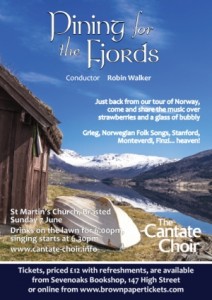 In late May, The Cantate Choir went tour again, this time to Norway. See the news pages for pictures of the trip. They gave a concert in Bergen cathedral after which they travelled to the heart of Norway to rekindle their friendship with The Førde Kammerkor to perform there. This choir came to sing with Cantate in Sevenoaks in October 2012.
In late May, The Cantate Choir went tour again, this time to Norway. See the news pages for pictures of the trip. They gave a concert in Bergen cathedral after which they travelled to the heart of Norway to rekindle their friendship with The Førde Kammerkor to perform there. This choir came to sing with Cantate in Sevenoaks in October 2012.
Once returned the choir reprised the repertoire from the tour to present to an Audience at St. Martin’s Brasted. The concert included performances of Grieg, Norwegian folk songs, Monteverdi’s Beatus Vir, Weelkes, Morley, Stanford and Vaughan Williams, performing madrigals outside on a lovely summer’s evening before moving into the church for the rest of the concert.
Norway Tour 2015 and our Summer Concert Pining for the Fijords
In May Cantate went on a choir tour to Norway to perform at concerts in various locations, renewing friends with Forde Kammerchor who visited the UK a few years ago and performed with Cantate in Otford. The choir first sang in Bergen Cathedral, joined by GNEIS, a young talented local choir. Then taking the trip up the coast the choir visited to Forde. The Forde Kammerchor were wonderful hosts for our visit and everyone enjoyed a convivial evening in a traditional barn where we all rehearsed ready for a concert at Forde Art Gallery. You will see some photos of the choir on the trip, including the one where the two choirs performed the Tapsrondo together!
Pining for the Fijords was our June concert. It was a lovely opportunity to sing the music prepared for the Norway tour to our audience at home. It also meant those choir members who were unable to go to Norway were able to perform some of the special Norwegian-flavoured repertoire that the choir had worked on; while for those who did go it was a chance to remember the unique atmosphere of light and water of Norway in summer, and think of the friends they made there.
So on a lovely, sunny summer’s evening we returned to Brasted to sing music from across the ages. We sang madrigals in the open while the audience enjoyed strawberries and a glass of sparkling wine, then moved inside to perform Monteverdi Beatus Vir along with English music from composers such as Stanford and Vaughan Williams, Norwegian songs by Grieg as well as traditional and modern settings of Scandinavian folksongs.
Top Choir Kent 2015 – Canterbury Gala Concert
As winners of Top Kent Choir, 2014, we performed at a special celebration in March to mark five years of this competition which does so much to raise money for charity. We joined six other choirs, all past finalists or runners up, each performing a 15 minute repertoire in the Shirley Hall in Canterbury. We included a clapping song too – which you can see us performing below. The evening culminated in a special performance by all the choirs and audience together of a special arrangement of ‘Help’ – the song by the Beatles – to mark its fiftieth anniversary. The whole event celebrated live music and singing, and we were delighted to be able to take part.
(photos copyright John Gichigi and The Rotary Club of Canterbury).

